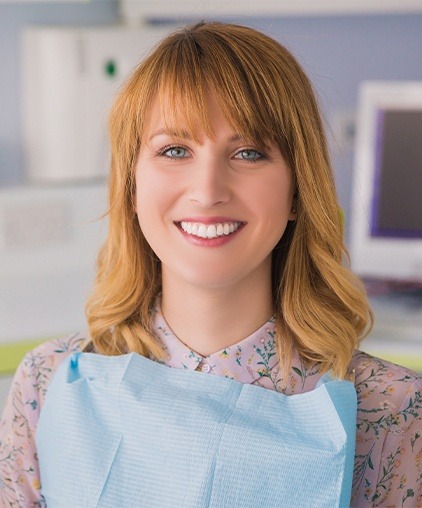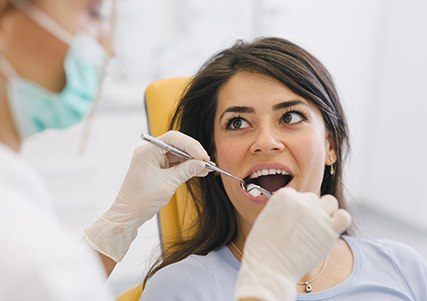
Tooth Extractions – Saginaw, TX
Safe, Pain-Free Extractions to Protect Your Oral Health
More often than not, our dental office is capable of saving damaged teeth via restorations and root canal therapy. However, there are instances where extracting a tooth is the most appropriate option, even if it’s far from our first choice. Rest assured, Dr. Renkuntla is trained to carefully and comfortably extract problematic teeth before they cause more damage to your nearby oral structures. So, if one or more of your teeth is badly decayed, infected, damaged, or contributing to overcrowding, don’t hesitate to schedule an appointment with us!

Why Choose Saginaw Dental for Tooth Extractions?
- Stay Relaxed with the Help of Sedation Dentistry
- Soft Tissue Laser Ensures More Conservative Treatment
- Implant Dentistry and Other Tooth Replacement Options Available
Reasons Why Tooth Extractions Are Necessary

One of our main priorities is to help you preserve all of your natural pearly whites. However, in some cases, the only viable option for keeping your smile safe is to pull a tooth that’s impacting your oral health. This can be due to various reasons, such as:
- Severe dental decay
- A large crack in your enamel
- Physical trauma
- Overcrowding
The Process of Removing a Tooth

When a tooth is so damaged that extraction is the only viable solution, we start by numbing the tooth and the surrounding gum tissue in order to minimize discomfort as much as possible. You should feel almost nothing during the treatment itself. After the anesthetic takes effect, we’ll use a dental elevator to break the tooth from the periodontal ligament. In some cases, we may need to break the tooth into smaller parts for easier removal. Finally, we use a pair of forceps to grasp and gently pull the tooth from your mouth. We’ll then ask you to bite down onto a gauze pad to reduce any bleeding.
Tooth Extraction Aftercare

Before you leave our office, we will provide you with a list of aftercare instructions, including:
- Changing the gauze pads as needed
- Keeping your head elevated (even when you sleep)
- Eating only soft foods, like cottage cheese
- Not smoking or spitting
- Taking OTC pain medication as directed
- Drinking lots of water to stay hydrated (just don’t use a straw)
Tooth Extraction FAQs
While a tooth extraction might be necessary (and is a routine procedure), it’s normal to want to know as much as possible beforehand. That’s why we’ve collected and answered several of our most commonly asked questions about this emergency dentistry treatment. Read on or give us a call today if you wish to learn more about tooth extractions in Saginaw!
What’s the Difference Between Tooth Extractions and Wisdom Tooth Surgery?
Although both dental treatments involve pulling a tooth out, there is a significant difference between them. In short, wisdom tooth surgery is solely meant to remove the third set of molars in your mouth. This surgical procedure may typically be required to remove a final molar that’s impacted or below the gumline and is pushing against the rest of your teeth. On the other hand, a tooth extraction can be performed to remove any other tooth that is damaged beyond repair, severely decayed/infected, or causing overcrowding.
Does Getting a Tooth Pulled Hurt?
You should not experience any discomfort throughout the dental procedure itself. Our team will make sure to completely numb your mouth with a local anesthetic before starting any work. This will ensure that you remain comfortable and safe during your appointment. After we’ve completed your oral surgery, you may expect some mild soreness and discomfort within the few days following your extraction. These sensations are usually temporary and can easily be managed by taking over-the-counter pain relievers and using a cold compress. We’ll provide you with specific aftercare instructions to help you have a smooth and speedy recovery. If any symptoms worsen over time, be sure to contact us for help.
How Should I Prepare for My Tooth Extraction?
Getting ready for your tooth extraction procedure is just as essential as caring properly for your mouth after your surgery. Before beginning your treatment, our team will answer any questions you might have and walk you through your pre-op instructions. These guidelines will include careful directions, such as drinking plenty of water and retrieving your prescribed medications. You’ll also need to arrange for a friend or family member to drive you to and from your appointment, as the local or general anesthesia won’t wear off until a few hours afterward.
Can I Smoke After Getting a Tooth Extracted?
We highly recommend that you avoid smoking or using tobacco right after finishing your tooth extraction(s). This will not only increase your risks of health issues like oral cancer, but it will also negatively impact your recovery process. While this is a great opportunity to quit smoking altogether, we typically suggest refraining from this habit for five days to a couple of weeks after your procedure at the very least. Feel free to consult our knowledgeable team if you need help quitting, and we’ll provide you with the resources, guidance, and support you need to make this process easier.